-
IP addresses are NOT logged in this forum so there's no point asking. Please note that this forum is full of homophobes, racists, lunatics, schizophrenics & absolute nut jobs with a smattering of geniuses, Chinese chauvinists, Moderate Muslims and last but not least a couple of "know-it-alls" constantly sprouting their dubious wisdom. If you believe that content generated by unsavory characters might cause you offense PLEASE LEAVE NOW! Sammyboy Admin and Staff are not responsible for your hurt feelings should you choose to read any of the content here. The OTHER forum is HERE so please stop asking.
You are using an out of date browser. It may not display this or other websites correctly.
You should upgrade or use an alternative browser.
You should upgrade or use an alternative browser.
Too bad they dun have enough oil for the US to introduce Democracy to them
don't talk cock please update your info.
very sad for PAP to have uneducated IB
let ahbang teach u :kma:
http://www.bloomberg.com/news/2013-...ependence-by-2035-on-shale-boom-iea-says.html
- Joined
- Jul 15, 2013
- Messages
- 153
- Points
- 0
N. Korea should face ICC over crimes against humanity : UN probe
AFP
February 18, 2014, 1:14 am

N. Korea should face ICC over crimes against humanity: UN probe AFP N. Korea should face ICC over crimes against humanity: UN probe
Geneva (AFP) - North Korea's leaders should be brought before an international court for a litany of crimes against humanity that include exterminating, starving and enslaving its population, a UN team said Monday.
A hard-hitting report on the nuclear-armed totalitarian state also strongly criticised its denial of basic freedoms of thought, expression and religion, and its abduction of citizens of neighbouring South Korea and Japan.
"Systemic, widespread and gross human rights violations have been and are being committed by the Democratic People's Republic of Korea, its institutions and officials," said the report by the Commission of Inquiry on North Korea set up in March 2013 by the UN Human Rights Council.
"In many instances, the violations of human rights found by the commission constitute crimes against humanity. These are not mere excesses of the state; they are essential components of a political system that has moved far from the ideals on which it claims to be founded," the report said.
"The gravity, scale and nature of these violations revealed a state that does not have any parallel in the contemporary world."
Commission chair Michael Kirby said the world could no longer plead ignorance as an excuse for a failure to act.
"At the end of the Second World War, so many people said: If only we had known... Now the international community does know," he said.
"There will be no excusing of failure of action because we didn?t know."
North Korea refused to cooperate with the investigation, claiming the evidence was "fabricated" by "forces hostile" to the country.
Kirby wrote to North Korean leader Kim Jong-un -- the third ruler of the communist dynasty founded by his grandfather in 1948 -- to give him a last chance to put his country's side.
In a January 20 letter, Kirby told Kim he could face justice personally for the crimes committed by the system he runs.
"Any official of the Democratic People's Republic of Korea who commits, orders, solicits or aids and abets crimes against humanity incurs criminal responsibility by international law and must be held accountable under that law," Kirby wrote.
- Call for ICC action -
The report said options included the UN Security Council referring the country to the International Criminal Court or setting up an ad hoc tribunal.
The United States welcomed the report, saying it "clearly and unequivocally documents the brutal reality" of North Korea's abuses.
But Pyongyang's key ally China strongly opposed such a move, saying it would "not help resolve the human rights situation" and that "constructive dialogue" was the answer.
North Korea has long faced international sanctions over its atomic weapons programme, but activists said that justice for its rights record was long overdue.
"This has been six decades of human rights abuse in its most extreme and callous form," said Juliette de Rivero of Human Rights Watch.
Denied access to North Korea, the commission gathered evidence at hearings in South Korea and Japan with North Korean exiles -- dubbed "human scum" by the regime.
Most potential witnesses were afraid to testify even on a confidential basis because of fears of reprisals against relatives still in the country.
North Korea's crimes against humanity entail "extermination, murder, enslavement, torture, imprisonment, rape, forced abortions and other sexual violence, persecution on political, religious, racial and gender grounds, the forcible transfer of populations, the enforced disappearance of persons and the inhumane act of knowingly causing prolonged starvation," the report said.
It condemned a system of throwing generations of the same family into prison camps under guilt-by-association rules, given testimony from former guards, inmates and neighbours.
It estimated that there are 80,000-120,000 political prisoners in North Korea, a nation of 24 million people.
North Korean exiles in Geneva recounted the horrors they faced.
Kim Hyu Suk, born in 1962, said she was taken to a camp aged just 10 because her grandfather escaped from North Korea.
"During the 28 years that I lived in the camp, I lost my grandmother, my mother, my siblings, my children," she told reporters.
- Abductions 'unique' in scale -
North Koreans' daily lives were marked by constant "surveillance, coercion, fear and punishment to preclude the expression of any dissent," the report said.
It estimated 200,000 people from other countries had been abducted by North Korea or disappeared after going there willingly.
Most were South Koreans stuck after the end of the 1950-1953 Korean War, and ethnic Koreans who arrived from Japan after 1959.
But hundreds of South Koreans, Japanese and nationals of countries including Thailand, Malaysia, Lebanon, Romania and France have also been pressganged as language teachers or even spouses.
North Korean defectors have also been kidnapped from countries including China, it said.
"These international enforced disappearances are unique in their intensity, scale and nature," the report said.
- Joined
- Jul 15, 2013
- Messages
- 153
- Points
- 0
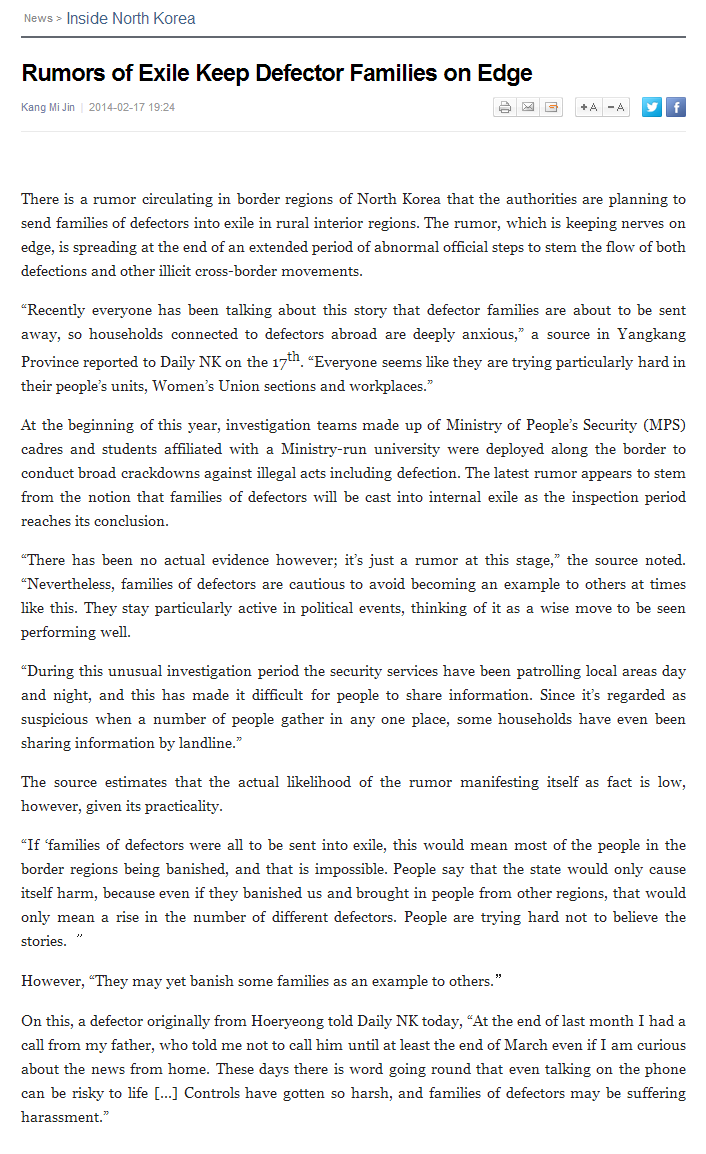
- Joined
- Jul 15, 2013
- Messages
- 153
- Points
- 0
Killing of Kim Jong-un's uncle chills North Korean expats in China
PUBLISHED : Wednesday, 19 February, 2014, 1:40am
UPDATED : Wednesday, 19 February, 2014, 2:16am
The Los Angeles Times in Yanji, China

Jang Song-thaek
She was a North Korean success story.
For more than two decades, the woman, now 50, dabbled in businesses along the border between China and North Korea. She sold rice, traded foreign currency and opened a massage parlour in China. She travelled between the two countries with relative ease and was making sufficient money to live comfortably, so much so that she rebuffed invitations to join a sister who had defected to South Korea.
But the woman, who did not want her name used out of fear for her safety, has changed her thinking about the future since the December execution of Jang Song-thaek, the uncle by marriage of North Korean leader Kim Jong-un. Jang, 67, was long viewed as a champion of free enterprise within the nominally communist state, and his purge has rattled many North Koreans.
"People are scared. If he could do this to his own uncle, what would he do to the rest of us?" said the woman in an interview in Yanji , a city near the North Korean border where she has been living in recent years.
The woman, trying hard not to look North Korean for fear of being deported, confided in a tremulous voice her plan to escape to South Korea.
The sentiment reverberates throughout the community of expatriate North Koreans here. Until recently, it was assumed that Kim, 31, would steer the country towards economic reform. In Pyongyang, there are new restaurants, a pizzeria and a coffee shop. The country in November announced 13 special economic zones designed to encourage free trade. There had been more tolerance for entrepreneurs selling at the jamadang, North Korea's open-air markets.
"We had been hopeful. We thought things were getting better," said the woman, who comes from Undok, a town in the far north that was part of a special economic zone.
Thousands of North Koreans live and work without legal standing across the border in northeastern China. About 1,500 North Koreans defected last year to South Korea, according to government figures from Seoul. Most initially crossed the China-North Korea border. The numbers tapered off recently, in part because the moribund North Korean economy looked as though it was coming to life. But the crossings are expected to pick up this year because of the reverberations from Jang's execution.
"It might be the largest wave of defections ever, not in numbers but in political significance," said Professor Andrei Lankov, a North Korea expert at Seoul's Kookmin University. "I would expect to see officers, people handling foreign trade, private operators and their families."
South Korean news media have been replete with reports of high-ranking defectors, among them Jang's minions in business and government. But it is clear from interviews near the border that low-level businesspeople, who never came close to meeting Jang, are among those shaken.
Even with North Korea's abysmal human-rights reputation the purge was shocking for its ruthlessness. Once the second-most powerful man in the country, Jang was shown on state television being yanked by his armpits out of his seat at a conclave of the ruling Workers' Party. State media denounced him as "despicable human scum, worse than a dog" and reported that he had been swiftly executed.
A report in South Korea said the North Korean government had also executed Jang's extended family, including a nephew who had been ambassador to Malaysia and a brother-in-law who had been ambassador to Cuba. That report was unconfirmed, but would be in keeping with long-standing North Korean policy to punish relatives of those accused of political crimes.
Some of the North Koreans in Yanji said they feared that the North Korean government would adopt a harsher policy toward defectors and the family members left behind.
"Now it is not just a question of disappointment. There is terror," said the businesswoman.
- Joined
- Jul 15, 2013
- Messages
- 153
- Points
- 0
UN report on North Korea a glimpse into a nightmare state
Report on North Korea by UN rights panel portrays world of torture, murder and all-pervasive fear
PUBLISHED : Tuesday, 18 February, 2014, 11:03pm
UPDATED : Wednesday, 19 February, 2014, 3:38am
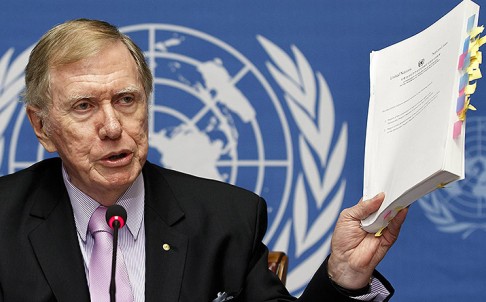
The UN's Michael Kirby said the findings reminded him of the extensive horrors spawned by Nazi Germany and other Axis powers. Photo: EPA
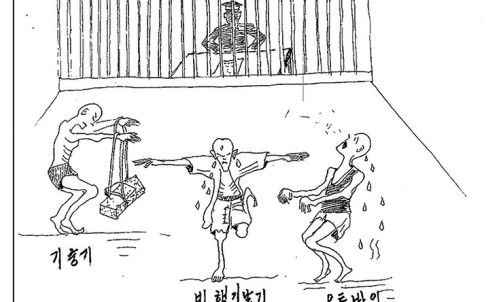
Drawings depicting torture methods are based on the accounts of a North Korean defector. Photo: EPA
Torture, deliberate starvation and other abuses carried out by North Korean authorities - possibly on the orders of supreme leader Kim Jong-un himself - constitute crimes against humanity and should be referred to an international court or tribunal for prosecution, UN investigators have said.
"These crimes against humanity entail extermination, murder, enslavement, torture, imprisonment, rape, forced abortions and other sexual violence, persecution on political, religious, racial and gender grounds, the forcible transfer of populations, the enforced disappearance of persons and the inhumane act of knowingly causing prolonged starvation," said a 400-page report unveiled in Geneva on Monday by the UN Commission of Inquiry on Human Rights in North Korea.
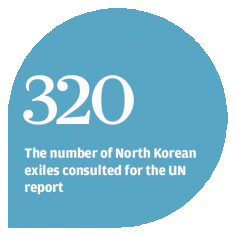
Watch: UN report: Former North Korea detainees speak of ordeal
<object classid="clsid

<embed src="https://static.movideo.com/flash/movideo_player.swf" quality="high" bgcolor="#000000" name="player-element" play="true" loop="false" allowscriptaccess="always" allowfullscreen="true" type="application/x-shockwave-flash" wmode="window" pluginspage="http://www.adobe.com/go/getflashplayer" flashvars="apiKey=movideoScmp&alias=SCMPflash&playerId=movideoScmp_SCMPflash_1392775264656&mediaId=727923" height="288" align="middle" width="512"></object>
It added that the "gravity, scale and nature of the violations" in the totalitarian state over several decades do not have "any parallel in the contemporary world".
The chair of the panel established by the UN Human Rights Council last March, retired Australian chief justice Michael Kirby, said the findings reminded him of the extensive horrors spawned by Nazi Germany and other Axis powers.
Among the most shocking stories gathered by the commission were those from the kwanliso political prison camps, evoking the darkest chapters of world history.
"One of the witnesses from one of the camps said that his duties included gathering up the bodies of those who had died of starvation and putting them in a pot and burning them," Kirby said. The ex-inmate then took the ash and remaining body parts to be used as fertiliser in nearby fields.
"When you see that image in your mind of bodies being burned, and of parts of bodies, unfortunately it does bring back to those, certainly of my age, memories of the end of the second world war," the 74-year-old said.
Barred by Pyongyang, the commission based its report on testimony from 320 North Korean exiles - dubbed "human scum" by Pyongyang.
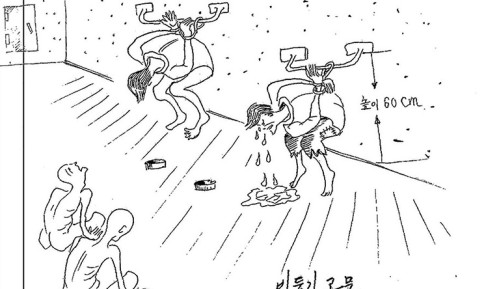
The report refers to torture methods with terms like "pigeon". Photo: EPA
The report said that many more people were afraid to speak, fearing the harm that the regime could inflict on relatives, or its history of abducting defectors from the countries where they had found a haven.
Pyongyang denies the existence of camps, but the report said that stance was disproved by testimony from former prisoners, guards and neighbours, along with satellite imagery.
"I hope the international community will be moved by the detail" in this report, Kirby said.
Although the report catalogues systematic abuses that have long been reported by human-rights activists, defectors, foreign media outlets and foreign governments, the comprehensive nature of the report by a UN-appointed panel itself was unprecedented.
The document called for urgent action by the international community, including referring the complaints to the International Criminal Court in the Hague. Alternatively, the report noted that the UN Security Council has the power to set up a special tribunal for North Korea.
However, many observers believe that any attempt to take such action would be blocked by China, North Korea's closest ally and a veto-wielding member of the UN Security Council. The report chastised China for forcibly repatriating some North Korean refugees and for denying some 20,000 children born to North Korean women in China health and educational services.
The UN Human Rights Council is scheduled to consider the panel's recommendations at a meeting next month.
North Korea rejected the panel's findings in a statement. "We will continue to strongly respond to the end to any attempt of regime-change and pressure under the pretext of `human rights protection'," it read, according to Reuters.
Wu Haitao, China's ambassador to the UN office in Geneva, said in a letter to the commission that the country did not support the establishment of the panel in the first place. He also reiterated Beijing's position that North Koreans who enter China "do it for economic reasons" and "are not refugees", noting that some had committed crimes including "theft, robbery and illegal harvesting" in China.
Between 80,000 and 120,000 people are thought to be held in North Korean camps, including generations of entire families arrested for alleged political crimes under collective guilt rules.
Hundreds of thousands of others were believed to have perished in the camps over the past half century, "gradually eliminated through deliberate starvation, forced labour, executions, torture", the report said.
Drawings by a former prisoner published in the report detailed torture methods with names like "pigeon", "aeroplane" and "motorcycle".
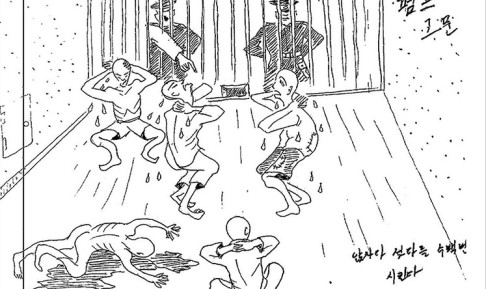
Another torture method is called the "aeroplane". Photo: EPA
Prisoners were also used for martial arts practice, forced to have abortions if they became pregnant, and lived on rodents and leaves.
The report also pointed to allegations that political prisoners were killed in medical experiments conducted to test the impact of chemical and biological weapons.
The report said, however, that it could not verify the accuracy of such claims, nor those regarding medical experiments in hospitals for the disabled. But it said it had clear evidence that chemicals were forced into women's vaginas to force abortions.
For those outside the camps, public executions and the fear of imprisonment were tools to "terrorise" the population, whose daily life was marked by constant "surveillance, coercion, fear and punishment to preclude the expression of any dissent", the report said.
It detailed the use of public executions with machine guns, with entire school classes brought to watch.
As part of the report, the panel published a three-page letter that it sent to Kim, alleging that the abuses were perpetrated by state security officials, the army, the judiciary, the Ministry of Security and the Workers' Party.
"It is open to inference that the officials are, in some instances, acting under your personal control," Kirby wrote.
The report did not list by name any particular officials that panellists believed should be held responsible, although it said it had a database of suspects.
The letter to Kim also drew attention to the principles of international criminal law, under which military commanders and civilian superiors can be held responsible for failing to prevent and stop crimes against humanity committed by people under their effective control.
One shocking section of the report is on the experiences of North Koreans who escape to China and are sent back, often with the assistance of Chinese authorities. The report describes forced, late-term abortions without anaesthetic, the use of chemicals to induce labour, beatings and poor nutrition.
Kenneth Roth, executive director at Human Rights Watch, said he hoped the report would "open the eyes of the UN Security Council", which he said had focused only on the nuclear threat posed by Pyongyang, and overlooked "the crimes of North Korean leaders who have overseen a brutal system of gulags, public executions, disappearances and mass starvation".
Agence France-Presse, The Los Angeles Times
- Joined
- Jul 15, 2013
- Messages
- 153
- Points
- 0
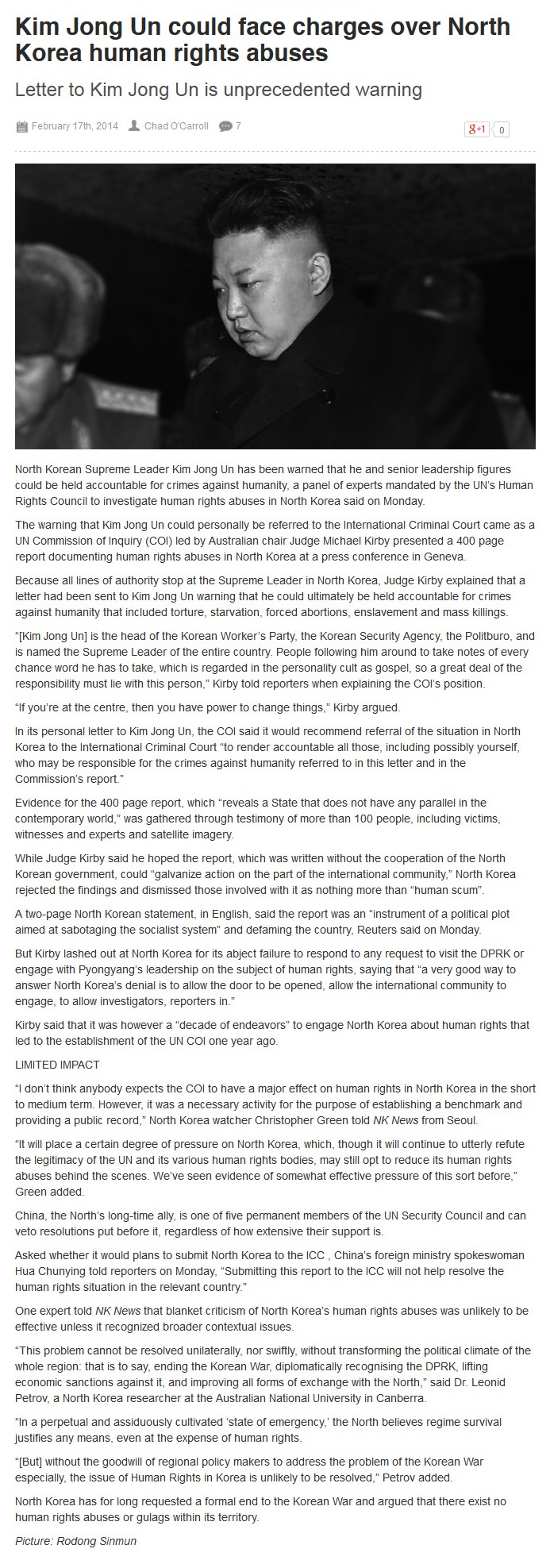
- Joined
- Jul 15, 2013
- Messages
- 153
- Points
- 0
Hong Kong-based missionary detained in Pyongyang ‘knew risks’ of trip, wife says
PUBLISHED : Wednesday, 19 February, 2014, 3:38pm
UPDATED : Wednesday, 19 February, 2014, 9:27pm
Kristine Servando
[email protected]
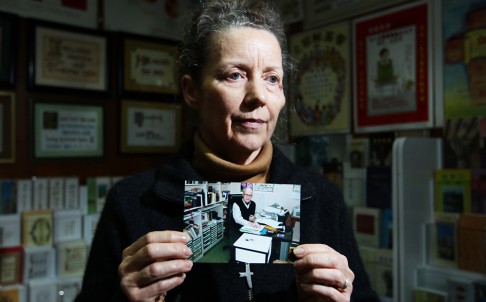
Karen Short is holding a photo of John Short, who has been reportedly detained in North Korea. Photo: Nora Tam
The wife of a Hong Kong-based Australian Christian missionary reportedly detained in North Korea said on Wednesday that he “knew the risks” of bringing in religious material into the authoritarian state.
Watch: Hong Kong-based missionary detained in Pyongyang ‘quite willing to suffer', wife says
<object classid="clsid

<embed src="https://static.movideo.com/flash/movideo_player.swf" quality="high" bgcolor="#000000" name="player-element" play="true" loop="false" allowscriptaccess="always" allowfullscreen="true" type="application/x-shockwave-flash" wmode="window" pluginspage="http://www.adobe.com/go/getflashplayer" flashvars="apiKey=movideoScmp&alias=SCMPflash&playerId=movideoScmp_SCMPflash_1392824314376&mediaId=730926" height="288" align="middle" width="512"></object>
John Short, 75, was on his second trip to Pyongyang with a tour group when he was detained, according to his wife of 36 years, Karen Short.
Sounding calm during a telephone interview with the South China Morning Post on Wednesday, Karen, who works for the nearly 100-year-old publishing firm Christian Book Room in Tsuen Wan, said that she first learned about her husband’s detention on Tuesday morning.
“This is out of the ordinary but we’re Christian missionaries so my husband knew what he was going into,” she said. “Ultimately we are in God’s hands and we totally believe that.
“He’s not reckless. He’s just not that sort of a person, but he’s a man of his convictions. The outcome is this because he was carrying Korean-language gospel material. They’re not happy,” she said.
Karen, who has lived with her husband in Hong Kong for 50 years, said that her husband had brought religious material into the country during his first trip, but had not encountered any problems. On his recent trip, however, he was repeatedly questioned by North Korean authorities.
“The first [visit] he was in a bigger tour group – a busload – and went in by train. This time he flew from Beijing and they came to his hotel on Sunday night and started questioning him, and the same [thing] was repeated three times the next day,” she said.
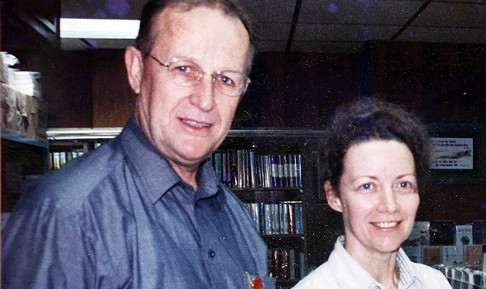
John Short with his wife Karen in Hong Kong. Photo: AP
She was told this information by the person travelling with her husband, a mainland Chinese man who was part of the tour group. Short said the companion was escorted to Pyongyang airport “and they [the officials] said they would send my husband as well but he didn’t arrive. So he’s still detained with the public security bureau”.
Asked why her husband chose to visit North Korea, she said: “It was of his own volition, because he cares for people that live in such difficult circumstances.”
Karen said she had contacted the Australian consulate in Hong Kong for assistance, but because it does not have direct ties to Pyongyang the case was directed to the Australian embassy in Seoul, which is “working with the Swedish consulate to determine where he is and what he has been charged with”.
She told Reuters that on her husband’s first trip, her husband had been transparent about his faith and had openly read his Bible in front of North Korean government guides when in Pyongyang.
Beijing Tourism Group, a Chinese firm identified by Short’s wife as the agency running the tour on which her husband went to Pyongyang, was non-committal when contacted by Reuters, and referred queries to the Chinese government.
It was unclear what charges, if any, John Short was facing. But Pyongyang has previously detained an American missionary, Kenneth Bae, for bringing in religious paraphernalia. He was sentenced to 15 years of hard labour for “hostile acts”.
Additional reporting by Reuters
- Joined
- Jul 15, 2013
- Messages
- 153
- Points
- 0
20 February 2014 Last updated at 06:18
South Koreans arrive in North for family reunions

More than 100 South Koreans have arrived in North Korea for reunions with their relatives - the first such events since 2010.
The reunions, which come after North Korea called for better relations between the two sides, are taking place from 20 to 25 February.
They are held for families separated after the Korean War. The relatives have not seen each other for decades.
They come ahead of planned US-South Korea drills, which begin on Monday.
North Korea had earlier threatened to cancel the reunions if the military exercises went ahead.
'A true miracle'
On Thursday, 82 elderly South Koreans, accompanied by 58 family members, left for North Korea by bus.
More than a dozen of them were in wheelchairs, and two travelled in ambulances as they needed medical attention, AFP news agency reported.
They carried gifts, including clothing, medicines and food for their relatives.
They were scheduled to meet their North Korea relatives in the North's Mount Kumgang resort at 15:00 local time (06:00 GMT), followed by dinner together.
Around 180 North Koreans were expected to attend the reunion.

Jang Choon poses for photographs with a picture of his youngest brother Jang Ha-choon in Namyangju, east of Seoul, 19 February 2014

File photo: North Koreans (on the bus) wave to their South Korean relatives as they bid farewell following their three-day family reunion at the Mount Kumgang resort in North Korea, 1 November 2010

Buses carrying attendees of a family reunion between North and South Korea leave the hotel in the eastern port city of Sokcho on 20 February 2014
One of those selected for the reunions was South Korean Lee Du-young, who is in his late 70s.
"It's hard for people to understand what it's like when you've been separated so long," he told the BBC.
"But it's a true miracle; I'm so elated. All that was missing in my life was my brother, and now that I can see him again, I'd have no regrets whatsoever if I were to die tomorrow."
He said that as well as warm clothing, he would buy his brother chocolate biscuits because he heard they were sought-after treats in North Korea.
South Korea's unification ministry said on Wednesday: "Currently, it does not appear that there will be any hindrance to the reunion event."
The reunions are highly emotional occasions. Families from both sides meet briefly at the events, before returning to their respective homes.
Only 100 or so relatives are chosen to take part each time, and North Korea has in the past cancelled the reunions after the South took actions it opposed.
The South Koreans relatives were briefed before the reunions and were told not to talk about politics.
Many people were separated from their relatives by the division of the Korean peninsula after the 1950-1953 war.
The Korean War ended in a ceasefire, not a peace treaty, and there are no direct means of communication for most North and South Koreans.
About 72,000 South Koreans are on a waiting list to join the family reunion events. Nearly half of them are over 80.
The reunions are the only legal way for families separated by the division of the country to see each other, the BBC's Lucy Williamson reports from the southern side of the Korean border.
They are a small but significant sign of better relations between the two Koreas, but for many of those not chosen this time, the benefits they offer are slow to arrive, our correspondent adds.
In 2010, the programme was suspended after the North's shelling of a South Korean border island.
- Joined
- Jul 15, 2013
- Messages
- 153
- Points
- 0
<script height="360px" width="640px" src="http://player.ooyala.com/iframe.js#pbid=YjMwNmI4YjU2MGM5ZWRjMzRmMjljMjc5&ec=Y4eG41MzrLu6eUF6TWhUwyz_zZiXKRj5"></script>
Watch the video
<iframe webkitallowfullscreen="true" src="http://player.ooyala.com/iframe.html#pbid=YjMwNmI4YjU2MGM5ZWRjMzRmMjljMjc5&ec=Y4eG41MzrLu6eUF6TWhUwyz_zZiXKRj5&docUrl=about%3Ablank" frameborder="0" height="360px" width="640px"></iframe>

Watch the video
<iframe webkitallowfullscreen="true" src="http://player.ooyala.com/iframe.html#pbid=YjMwNmI4YjU2MGM5ZWRjMzRmMjljMjc5&ec=Y4eG41MzrLu6eUF6TWhUwyz_zZiXKRj5&docUrl=about%3Ablank" frameborder="0" height="360px" width="640px"></iframe>

Last edited:
- Joined
- Jul 15, 2013
- Messages
- 153
- Points
- 0
Dodging the Pyongyang Propaganda Trap
[Sohn Gwang Joo Column] 2014-02-20
North Korea’s propaganda offensive has been unleashed upon the world, from its nearest neighbor to the halls of the United Nations.
On January 16th, the powerful National Defense Commission unveiled a series of proposals aimed at improving inter-Korean relations, while calling also for the cessation of all mutual “hostile military actions.” These proposals were stressed once again in a document distributed via the United Nations Security Council on January 27th.
In the meantime, on January 23rd North Korea’s ambassador to the United Nations Shin Son Ho appeared at a press conference espousing similar sentiments. This was followed by ambassador to China Ji Jae Ryong reiterating to foreign press that “hostile military actions” must stop if North-South relations are to improve. “Denuclearization is the unchanging goal of the Chosun Peninsula,” he said. The regime has "taken its seat on the boat for the Six-Party Talks” and is now waiting to be joined by the other participants.
With regards to South Korea, the North is using the humanitarian issue of separated families as a decoy to foster domestic opposition to the upcoming joint ROK-U.S. military drills, and, vis the United States, Kim Jong Eun is getting the most out of his “friend” Dennis Rodman. There is no chance of Rodman grasping the concept of a “propaganda war," but he certainly fulfilled his role as a “useful idiot” by offering to “invite CNN to Pyongyang” to repay the lavish hospitality that was bestowed upon him.
What is motivating North Korea to engage in this propaganda war beyond its shores? The answer is that, at the current juncture, they simply have no other option.
It is customary for the regime to counteract the annual “Key Resolve” defensive drills, though that response tends to occur on a smaller scale. Given that they executed emergency nationwide training last year, we must wait and see what they will do this time around.
Some believe the North’s extreme sensitivity over the drills stems from their perennial fuel and financial shortages. This is not the complete picture, however.
The current state of North Korea’s internal affairs is simply not conducive to the large-scale mobilization of the military to provide a “response-in-kind” to the ROK-U.S. display of military might, especially when we consider the fact that they are still in damage control mode in the aftermath of the Jang Song Taek purge. Large-scale military mobilization could even allow for a coup d’etat by Jang loyalists under the pretext of training. Indeed, one prominent U.S. think-tank, RAND Corporation believes there may have been an assassination attempt on Kim Jong Eun during military training last year.
No matter how unscathed Kim Jong Eun appears on the outside, he was skating on thin ice even prior to the Jang Song Taek incident. Even if we disregard every other sign of trouble; five changes of the Chosun People’s Army Chief-of-Staff in a matter of months has never occurred at any stage of the Kim dynasty before.
There was not even a new Chief-of-Staff during the factional uprisings in August of 1956, one of the most unstable periods for Kim Il Sung's grip on power. Nor was the Chief-of-Staff changed during the Kim Chang Bong and Ho Bong Hak incident; nor the Kapsan faction incident; nor the Chongjin 6th Army Corps incident. There was no change of Chief-of-Staff during the mid-1990s in the midst of widespread starvation.
Objectively speaking, the internal workings of the North Korean military are now at their most insecure since the end of the Korean War. Inadequate supplies are the basis of this insecurity, which in turn has seen the military command structure compromised. It was in this context that the Jang Song Taek incident took place, and the aftershocks are still being felt.
On the 31st, Japanese daily Yomiuri Shimbun reported that 16 of Jang Song Taek’s associates had been executed and that a list of their names had been sent to overseas embassies and postings. The list was sent to demonstrate that Jang’s international business network is now defunct, and that these business rights are now in the possession of the military.
The current circumstances make it difficult for the regime to respond to the joint military drills with large-scale military mobilization, so they are engaging in an ideological war on the domestic front instead. This is designed to prevent defection and the further infiltration of outside information. Outside the country, the only thing they can do is try and break free from their disadvantageous position by engaging in a multifaceted propaganda offensive. The so-called "peace offensive" emanating from Pyongyang is pure propaganda without so much as a hint of sincerity.
Some people take the North Korean propaganda at face value, and this leads them to muse: “North Korea is changing gently, so we too should ease off a little from insisting that they abandon their nuke program before we talk.” Such people unwittingly aid the Kim Jong Eun regime. (Of course, exchanges in the fields of human rights, sports, academia, intelligence, religion, and youth remain advantageous to us, and should take place.)
If we consider Pyongyang’s ongoing outward-focused propaganda and the events taking place internally, we can get a sense of their mission. We'll get an even clearer picture of Kim Jong Eun’s intent from his reaction to the Key Resolve-Foal Eagle joint drills. The exercises are significant for this very reason.
There are many hotspots around the world. Where will the next one arise? The troubles in the Middle East have reached their zenith and are now on the wane. Presently, the most turbulent area in the world is clearly East Asia, where the U.S., China, Japan, Russia, South Korea and North Korea converge. Events taking place in and around the Korean Peninsula could have a major impact on world affairs going forward, including on the military landscape of the region.
Over the last ten years, the core of the changing situation in East Asia and on the Korean Peninsula has been the rise of China. Here, the U.S. and Japan have responded strategically, and more changes can be expected in future. The problem is that the changes are happening too fast. There is the possibility of a military collision over the Senkaku Islands.
This has led North Korea, which has been dominating the news since 1990 with its nuclear development and “military-first” policy, to take a back seat in East Asia. If China were to take serious action when faced with the possibility of Japanese nuclearization, North Korea’s nuclear weapons would become an “issue to be gotten rid of quickly” by the U.S. and China. This shift in priorities would deal the final flow to Kim Jong Eun’s “Byungjin Line” of simultaneous nuclear and economic development.
Moreover, as tensions between China and Japan grow ever more acute, the North Korean nuclear issue is pushed from the lead spot into a supporting role; an “extra.” The absolutist totalitarian regime of the Kim dynasty only has a chance of survival if it maintains both an internal and external target. (Such targets include class, anti-factionalist and anti-imperialist struggle.)
Kim Jong Eun needs to escalate the tension, otherwise he will be cornered and left in a situation where his power could be compromised. Domestic and external factors are leading the Kim Jong Eun regime in an unfavorable direction.
North Korea has several options to ratchet up military tensions on the peninsula; a fourth nuclear test, a long range missile launch, or a provocation against the South. Of these, the fourth nuclear test and the long-range missile test would directly antagonize China, the U.S. and Japan. The one sure option is to make a military hostage out of South Korea– a nation that possesses no nuclear weapons.
Thus, Pyongyang's endgame is to hold South Korea hostage and utilize this leverage to hash out a peace treaty with the U.S. The alternative is that South Korea will transform North Korea into an open, democratic society, thereby rendering its need for nuclear weapons obsolete. Only one of these two can emerge victorious.
All North Korea has is nuclear force. What South Korea has is combined forces with the U.S., economic power and diplomatic clout. Additionally, Seoul possesses one even more powerful tool: the strength of freedom, human rights and democracy. If we utilize these tools with vigilance, we will see change in North Korea within one or two years without having to spend a dime.
If a society is to progress, there is no such thing as a “free lunch." Someone must step up and lead the movement to denuclearize and democratize North Korea. That someone is a team of South Korea and the 24 million citizens of North Korea. It is extremely important that this point is fully understood. Otherwise, we may fall into the trap of Pyongyang’s propaganda war.
- Joined
- May 27, 2013
- Messages
- 178
- Points
- 0
I'll huff, and I'll puff, and I'll blow your house down
SYDNEY: An Australian missionary detained in North Korea left pamphlets promoting Christianity in a Buddhist temple, with his guide informing security officials, his travel companion told media Thursday.
Hong Kong-based John Short, 75, was taken from his Pyongyang hotel on Monday by North Korean police, two days after arriving from Beijing as part of a small tour group, according to his wife Karen.
He is being held for allegedly distributing Korean-language Christian pamphlets and attempting to proselytise, which is illegal in a country that views foreign missionaries as seditious elements intent on fomenting unrest.
Short has reportedly admitted to North Korean authorities that his trip to the isolated country was not only for tourism.
The Australian Broadcasting Corporation said he was on a two-man trip with Chinese Christian Wang Chong, who has returned to Beijing and said their problems stemmed from a visit to a Buddhist temple.
He said Short left pamphlet materials promoting Christianity at the site.
"They took us to a mountain to visit a temple and a Buddhist statue was broken or smashed by someone. The door of this temple was damaged too," Wang told the broadcaster.
"They were not happy for us to see this damage. We took some photos. They asked us to delete them and we deleted them.
"(Short) didn't feel comfortable in his heart and he left a pamphlet there relating to the gospel."
Their local North Korean tour guide reported this, and security officials found more Korean-language material in his luggage at his hotel, Wang said.
The ABC said the Chinese tour company that booked the trip, BTG, was in touch with its North Korean counterparts, and employee Han Weiping claimed Short had admitted he was there for more than just tourism.
"When we called the DPRK travel agency they said he had admitted that he didn't go to North Korea only for tourism," Han told the ABC, adding that the trip was supposed to be for four days.
"The pamphlet event happened on the second day," she said.
"And on the third day it was planned for them to visit some sites, but the Australian man said he didn't want to go out and instead wanted to stay in the hotel.
"So the North Koreans could've become even more suspicious that he wasn't there as a tourist."
Canberra is working on the case via the Swedish embassy in Pyongyang, which represents its interests in the absence of diplomatic relations between Australia and North Korea.
Pyongyang had sought to re-open its embassy in Canberra last year but was rebuffed in March after conducting a nuclear test.
Prime Minister Tony Abbott on Thursday used Short's detention to warn travellers they must obey the laws of the countries they visit.
"Not all countries have the same legal system or the same laws as Australia," he said, with Short potentially facing a long jail term.
North Korea is also holding US citizen Kenneth Bae, described by a North Korean court as a militant Christian evangelist.
He was arrested in November 2012 and sentenced to 15 years' hard labour on charges of seeking to topple the government.
Short has lived in Asia for five decades and runs a publishing house in Hong Kong that distributes calendars, Bibles and tracts in Chinese and other languages, his wife said.
Although religious freedom is enshrined in the North Korean constitution, it does not exist in practice and religious activity is restricted to officially-recognised groups linked to the government.
Short's detention comes just days after a hard-hitting United Nations report, headed by an Australian former judge, outlined a litany of crimes against humanity in North Korea, including mass murder, enslavement and starvation.
North Korea refused to cooperate with the commission, claiming its evidence was "fabricated" by "hostile" forces.
- AFP/xq
Hong Kong-based John Short, 75, was taken from his Pyongyang hotel on Monday by North Korean police, two days after arriving from Beijing as part of a small tour group, according to his wife Karen.
He is being held for allegedly distributing Korean-language Christian pamphlets and attempting to proselytise, which is illegal in a country that views foreign missionaries as seditious elements intent on fomenting unrest.
Short has reportedly admitted to North Korean authorities that his trip to the isolated country was not only for tourism.
The Australian Broadcasting Corporation said he was on a two-man trip with Chinese Christian Wang Chong, who has returned to Beijing and said their problems stemmed from a visit to a Buddhist temple.
He said Short left pamphlet materials promoting Christianity at the site.
"They took us to a mountain to visit a temple and a Buddhist statue was broken or smashed by someone. The door of this temple was damaged too," Wang told the broadcaster.
"They were not happy for us to see this damage. We took some photos. They asked us to delete them and we deleted them.
"(Short) didn't feel comfortable in his heart and he left a pamphlet there relating to the gospel."
Their local North Korean tour guide reported this, and security officials found more Korean-language material in his luggage at his hotel, Wang said.
The ABC said the Chinese tour company that booked the trip, BTG, was in touch with its North Korean counterparts, and employee Han Weiping claimed Short had admitted he was there for more than just tourism.
"When we called the DPRK travel agency they said he had admitted that he didn't go to North Korea only for tourism," Han told the ABC, adding that the trip was supposed to be for four days.
"The pamphlet event happened on the second day," she said.
"And on the third day it was planned for them to visit some sites, but the Australian man said he didn't want to go out and instead wanted to stay in the hotel.
"So the North Koreans could've become even more suspicious that he wasn't there as a tourist."
Canberra is working on the case via the Swedish embassy in Pyongyang, which represents its interests in the absence of diplomatic relations between Australia and North Korea.
Pyongyang had sought to re-open its embassy in Canberra last year but was rebuffed in March after conducting a nuclear test.
Prime Minister Tony Abbott on Thursday used Short's detention to warn travellers they must obey the laws of the countries they visit.
"Not all countries have the same legal system or the same laws as Australia," he said, with Short potentially facing a long jail term.
North Korea is also holding US citizen Kenneth Bae, described by a North Korean court as a militant Christian evangelist.
He was arrested in November 2012 and sentenced to 15 years' hard labour on charges of seeking to topple the government.
Short has lived in Asia for five decades and runs a publishing house in Hong Kong that distributes calendars, Bibles and tracts in Chinese and other languages, his wife said.
Although religious freedom is enshrined in the North Korean constitution, it does not exist in practice and religious activity is restricted to officially-recognised groups linked to the government.
Short's detention comes just days after a hard-hitting United Nations report, headed by an Australian former judge, outlined a litany of crimes against humanity in North Korea, including mass murder, enslavement and starvation.
North Korea refused to cooperate with the commission, claiming its evidence was "fabricated" by "hostile" forces.
- AFP/xq
Bittersweet tears as divided Koreans meet after 60 years
AFP
February 20, 2014, 10:03 pm

Sokcho (South Korea) (AFP) - Several hundred elderly South and North Korean relatives clung to each-other, rocking and weeping, as they met for the first time in 60 years Thursday at a reunion for families divided by the Korean War.
The emotional gathering at North Korea's Mount Kumgang resort was the result of tortuous, high-level negotiations between Pyongyang and Seoul, which had nearly broken down over the North's objections to overlapping South Korea-US military drills.
Television footage showed snow falling hard as 82 South Koreans -- some so frail they had to be stretchered indoors -- arrived at the resort in a convoy of buses to meet 180 North Korean relatives they have not seen for decades.
Inside the main hall, where numbered tables had been laid out, there were moving scenes as divided brothers, sisters, uncles, aunts, step-siblings and in-laws sought each other out and then collapsed into each others' arms.
Choi Byung-Kwan, 67, whose father was taken to the North during the 1950-53 conflict where he remarried and had seven children, broke down as he hugged his step-brother and step-sister.
"At least he had a family up here so he must have felt less lonely," Choi said of his father. "How lonely would he have been if he didn't have a family of his own in the North?"
Nearly everyone had brought photographs, either tattered, black and white images of the family before it was split up, or brand new colour snaps of their current families.
These were then passed around, stroked and cried over.
The North Korean women wore traditional hanbok dresses, while the men were mostly dressed in dark suits. All seemed to be sporting badges of former leaders Kim Il-Sung and Kim Jong-Il -- obligatory accessories in North Korea.
A grand dinner was planned for the evening and on Friday the reunited relatives were to be given the chance for more private gatherings in their guest rooms.
According to officials in Seoul, the North Korean group included two South Korean fishermen who had been kidnapped by the North in the 1970s.
- Bags of gifts -
The South Koreans, with an average age of 84, had left the eastern port city of Sokcho at 8:30am on board 10 buses, with half a dozen police vehicles as escorts.
The departure was delayed as two woman needed medical attention, and ended up being taken in ambulances for the entire journey.
More than a dozen were in wheelchairs and needed help getting on and off the buses, which they shared with 58 family members, brought along for physical as well as emotional support.
All carried bags stuffed with gifts, ranging from basic medicines to framed family photos and packets of instant noodles.
"The gifts I'm bringing to my sister should be good. Something you can't see much in North Korea so I hope she will be happy," said Kim Se-Rin, 85.
"I've also included some US dollars for her and my younger brother," Kim said.
Millions of Koreans were separated by the 1950-53 war, and the vast majority have since died without having any communication at all with surviving relatives.
The reunion programme began in earnest after a historic North-South summit in 2000, but the waiting list has always been far larger than the numbers that could be accommodated.
- 'First and last reunion' -
For many people, time simply ran out. Last year alone 3,800 South Korean applicants for reunions died without ever seeing their relatives.
For all the joy the reunion brings, it is tempered by the realisation that -- given the participants' advanced ages -- it also marks a final farewell.
"This will be our first and last reunion," Kim Dong-Bin, 81, said of the elder sister he left decades ago in Pyongyang.
All the South Koreans had spent Wednesday night in a Sokcho hotel, where they were given an "orientation" course by South Korean officials listing a series of dos and don'ts for their stay in Mount Kumgang.
"They were basically telling people not to discuss any political issues and not to be swayed by North Korean propaganda," said Kim's wife, Shin Myung-Soon.
Before boarding the buses to cross the heavily-militarised border, they spoke of their hopes and anxieties ahead of the meetings they had dreamed of for so long.
"I think when I see her face, I won't believe it's real," Kim said of his sister.
"I wonder if I will be able to recognise her immediately? It's been so long," he added.
It was the first meeting of divided families since the reunion programme was suspended following the North's shelling of a South Korean border island in 2010.
- Joined
- Jul 15, 2013
- Messages
- 153
- Points
- 0
Politics intrude at emotional Korean family reunion
South Koreans complain reunions tainted by political indoctrination
PUBLISHED : Friday, 21 February, 2014, 6:42pm
UPDATED : Friday, 21 February, 2014, 6:42pm
Agence France-Presse in Seoul
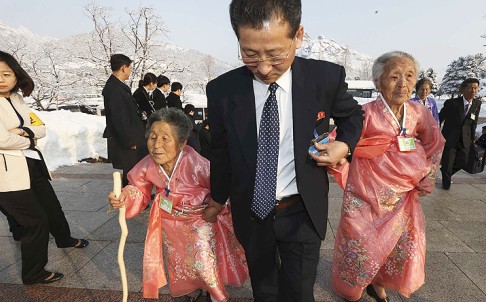
A North Korean man escorts his relatives to the Separated Family Reunion Meeting at Diamond Mountain resort in North Korea, on Friday. Photo: AP
Around 80 elderly South Koreans met privately on Friday with North Korean relatives they hadn’t seen for 60 years, but several complained the moment was tainted by political indoctrination.
On the second day of the first North-South reunion for more than three years of families divided by the Korean war, the relatives were allowed to meet on their own, without the TV cameras that intruded on their first emotional gathering the day before.
The event, held at a mountain resort in North Korea, was only secured after intense North-South negotiations, and has been seen by many as a possible first step towards improved inter-Korean co-operation.
It followed a rare concession from North Korea, which had originally threatened to cancel if the South and the United States pushed ahead with annual joint military drills that begin on Monday.
In an apparent goodwill gesture, Seoul on Friday approved the shipment by two private aid groups for close to US$1 million worth of tuberculosis medicine and powdered milk to North Korea.
After the private meetings, a number of the South Korean participants complained that their Northern relatives had felt obliged to deliver political sermons parroting Pyongyang’s official propaganda.
“I was a bit worn out due to all their political comments,” said Choi Don-myung after the three-hour meeting with her brother and his daughter.
Choi also voiced surprise that they had refused to accept the gifts she had brought, saying they had all they needed.
Kim Dong-bin, 81, said the two sisters he had come to see spent a substantial amount of time condemning the continued presence of US troops in South Korea.
“They heaped abuse on the US troops and said re-unification was only possible if they pull out,” Kim said.
The 82 South Korean participants, with an average age of 84 and some so frail they had to be moved by ambulance, arrived at the resort midday on Thursday after crossing the heavily-militarised border in a convoy of 10 buses.
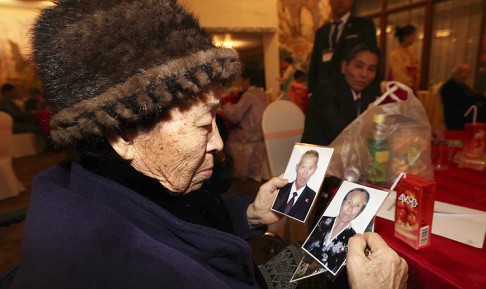
South Korean Kim Sun-yeon, 80, looks at pictures of her North Korean sister and her sister's husband given to her during their family reunion on Friday. Photo: Reuters
After a brief lunch, they were led into a banquet hall where they first came face-to-face with the 180 North Korean relatives they had applied to see.
Some simply embraced and sobbed, while others stared and stroked each other’s faces, seemingly unable to believe that they were in the same room.
Photos were exchanged and lovingly pored over, including old black-and-white ones of the family when it was together as well as brand new colour pictures of husbands, wives, children and grandchildren that neither side knew even existed.
Taking DNA samples
For some people, faded photos of infant siblings weren’t enough.
One South Korean man who came to be reunited with a younger brother he could barely remember, insisted on taking some hair samples to confirm they really were related.
“I’m going to get some DNA tests done,” he said.
Tens of millions of people were displaced by the sweep of the 1950-53 Korean war, which saw the frontline yo-yo from the south of the Korean peninsula to the northern border with China and back again.
The chaos and devastation separated brothers and sisters, parents and children, husbands and wives.
Because the conflict concluded with an armistice rather than a peace treaty, the two Koreas technically remain at war and direct exchanges of letters or telephone calls are prohibited.
The reunion programme began in earnest after a historic North-South summit in 2000, but the numbers clamouring for a chance to participate have always far outstripped those actually selected.
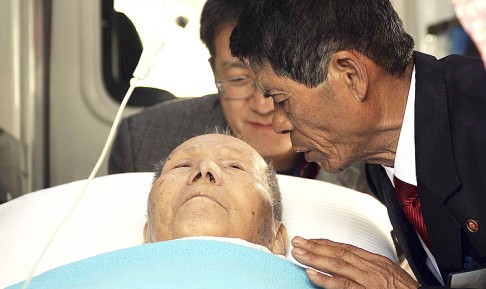
North Korean Kim Jin-cheon (right), 66, looks at his South Korean father Kim Seom-kyung, 91, lying on a stretcher inside an ambulance as Kim Seom-kyung prepare to leave for South Korea due to health reasons on Friday. Photo: Reuters
For many people, time simply ran out. Last year alone, 3,800 South Koreans who had applied for reunions died.
Of the 82 South Koreans attending the current reunion, 14 needed wheelchairs and two were forced to return home a day early for health reasons.
One of those was Hong Sin-ja, 84, who left after a private meeting with her younger North Korean sister.
“I want to go back together with my sister,” Hong said before she was lifted into an ambulance for the journey back to the South.
“There is no way to describe how heartbroken and sad I feel. I’m worried even though she says she has been living well.”
On Saturday comes probably the most traumatic moment of all: a farewell ceremony that both sides understand – given their advanced ages – marks the last time they will ever see each other.
- Joined
- Jul 15, 2013
- Messages
- 153
- Points
- 0
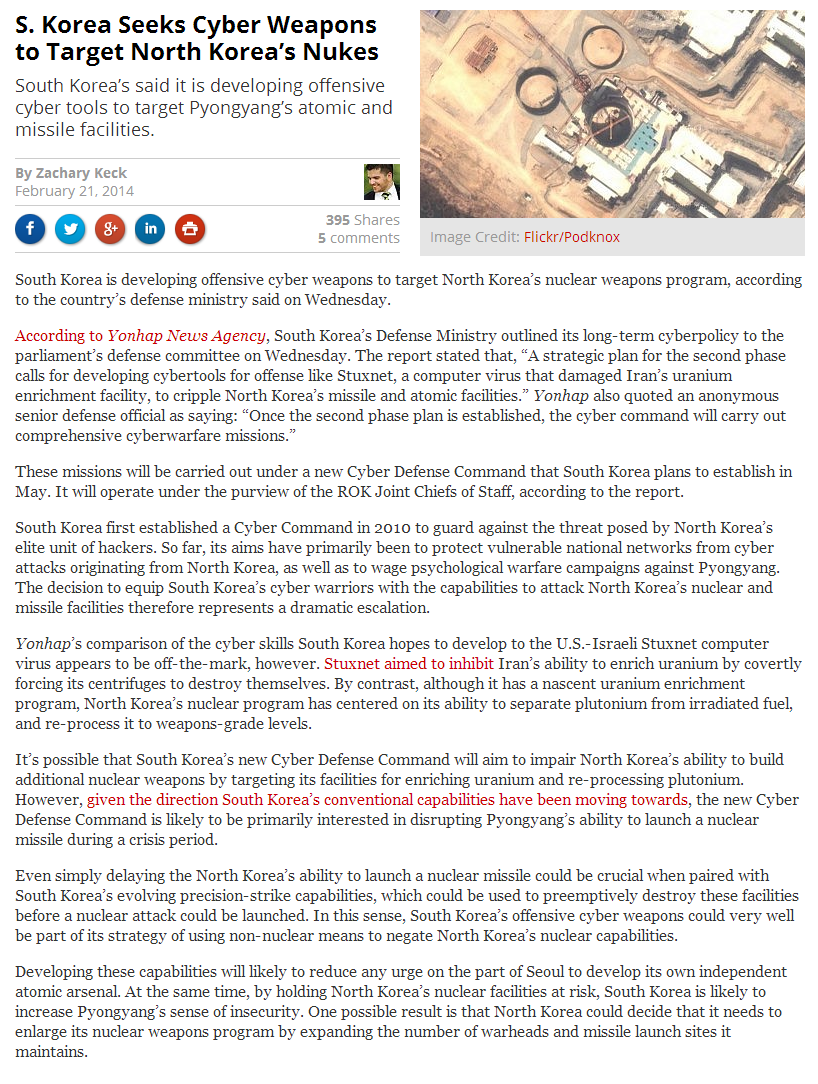
- Joined
- Jul 15, 2013
- Messages
- 153
- Points
- 0

- Joined
- Jul 15, 2013
- Messages
- 153
- Points
- 0

- Joined
- Jul 15, 2013
- Messages
- 153
- Points
- 0
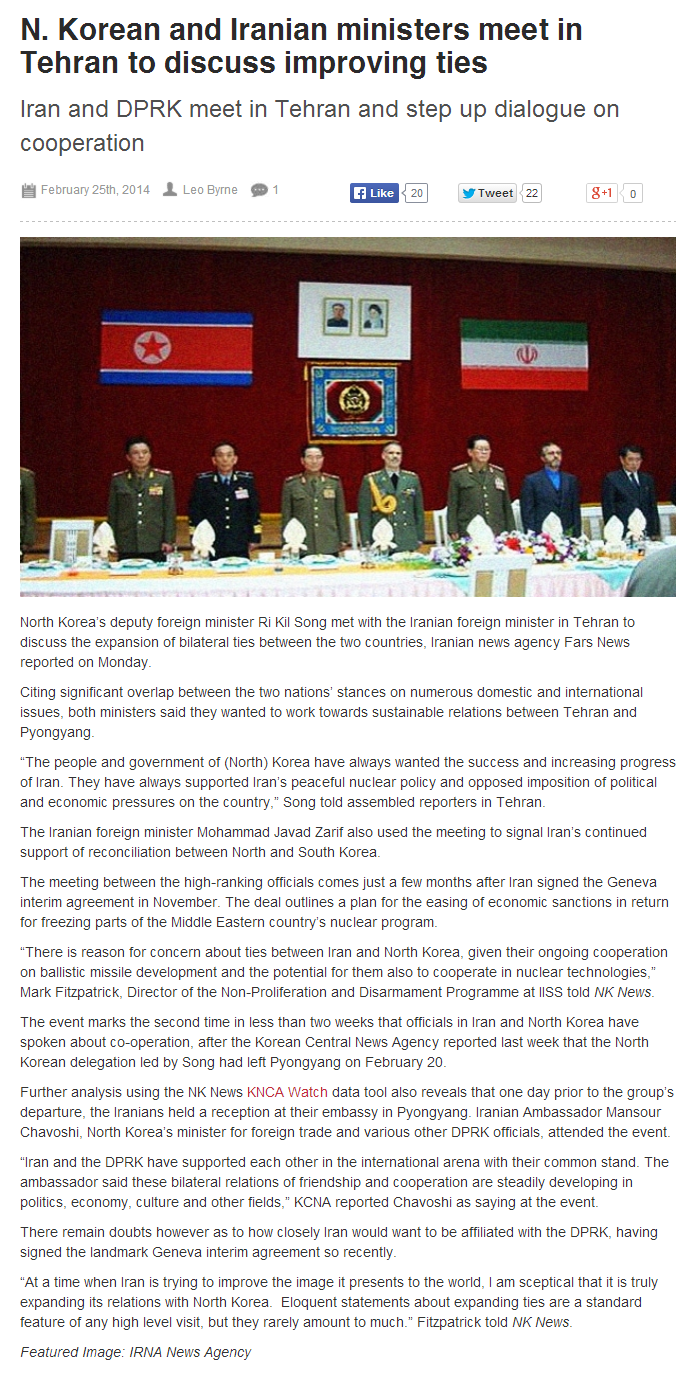
Similar threads
- Replies
- 1
- Views
- 844
- Replies
- 4
- Views
- 585
- Replies
- 3
- Views
- 571
- Replies
- 2
- Views
- 581
